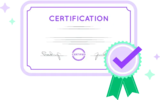Kubernetes Certification Training Course




 Kubernetes certification placeholder course is designed by StarAgile to help the learners understand how to set up their Kubernetes cluster, how to configure the networking between the pods and provide security to the cluster.
Kubernetes certification placeholder course is designed by StarAgile to help the learners understand how to set up their Kubernetes cluster, how to configure the networking between the pods and provide security to the cluster.  Kubernetes course is an online training that is live and interactive that throws light on the Kubernetes concepts. Further, the course is structured based on the CKA examination.
Kubernetes course is an online training that is live and interactive that throws light on the Kubernetes concepts. Further, the course is structured based on the CKA examination.
Kubernetes Certification Training
 36 Hours of Live Virtual Training
36 Hours of Live Virtual Training  Hands-On Assignments for Each Module
Hands-On Assignments for Each Module  20+ years Highly Experienced Trainers
20+ years Highly Experienced Trainers
 24/7 Support
24/7 Support  Course Completion Certificate
Course Completion Certificate
Kubernetes Course Content
Upcoming DevOps Trainings

Currently, we don't have any batch scheduled in your region.
You can request a new batch on your preferred date!
The work force is your asset. Up-Skill them with our Corporate Training Programs!
 Unleash In-Demand Skills Across the Enterprise
Unleash In-Demand Skills Across the Enterprise  Align Skill Development with Business Objectives
Align Skill Development with Business Objectives
 Drive Increased Employee Productivity
Drive Increased Employee Productivity  Leverage Immersive Learning
Leverage Immersive Learning
Kubernetes Course Overview
What is Kubernetes? What you will learn from Kubernetes associate Training?
Kubernetes, an open source, extensible and portable platform that helps to manage containerized services and workloads. It also facilitates automation and declarative configuration. Kubernetes is a Greek word that means pilot.
Kubernetes Certificate

Kubernetes Certification and Training FAQ's
Absolutely yes. Contact us before the 1st day of training to cancel the enrolment.
StarAgile provides recordings of each class so you can review them as needed before the next session
The purpose of CKA certification is to assure the participants to acquire knowledge in Kubernetes concepts, set up Kubernetes cluster, and configure networking between pods and secure clusters. A CKA test will contain questions in the following sections
• Application lifecycle management
• Installation, validation, and configuration
• Core concepts
• Networking
• Scheduling
• Cluster maintenance
• Security and storage
• Logging, monitoring, and troubleshooting
The current market is wide open for certified Kubernetes administrators. Knowledge in Kubernetes can help one start with a salary of 5 LPA according to Payscale.com. Following are the job roles one can obtain after getting Kubernetes certification
• Site reliability engineer
• Cloud engineer
• Systems engineer
• DevOps engineer
• Software escalation engineer
• Java architect
• Python developer
A basic understanding of dockers and containers is the primary prerequisite for attending this course and becoming a certified Kubernetes administrator. Working knowledge in Linux shell is an added advantage.
Kubernetes certification prepares the participant to understand Kubernetes concepts and get CKA certification. Therefore this course is suitable for those who want to become a Kubernetes cluster administrator. All those who incline towards learning the working of Kubernetes including developers, administrators, and cloud programmers can apply for this course.
A portable container engine was gifted to the IT business with a Docker container engine. Several organizations are using docker and Kubernetes is the major player in the container orchestration space. Thus Kubernetes work with docker and also replaces high-level functions like docker swarm. It scales and load balances the service delivery and secret management. Thus learning Kubernetes will provide a better opportunity and career prospect.
The open-source system Kubernetes is used to automate deployment, scale, and manage containerized applications. It is an orchestration tool starting with the Docker container collection; it controls the resource allocation and manages the traffic for cloud applications.
It is used to run workloads in public cloud providers and also allows the cluster to integrate with the cloud providers it is running on.
Installing Kubernetes on Windows involves setting up Minikube or Docker Desktop, which both offer a local Kubernetes cluster environment. You can the detail step by step process inside our blog, how to install Kubernetes on Wndows
Distinctions and Achievements


Kubernetes Certification Training
This Kubernetes certification will teach all concepts associated with Kubernetes and will make you a certified Kubernetes administrator. The course covers the following in detail.
1. Kubernetes core concepts and common commands
2. Pods basics, configuring the network on the cluster nodes
3. Setting up the cluster and securing clusters
4. How to deploy pods and use the containers in it
5. How to make use of the certificates for authenticating the resources
6. What are services, controllers, and service networking
7. How to deploy and configure network load balancers
8. How to configure Kubernetes scheduler and run multiple schedulers
9. Deploy replication controllers and use DaemonSets on nodes
10. How to use HPA for dynamic workload management
11. Persistent storage methods namely the persistent volume and persistent volume claim and how to deploy them
12. Secrets and config maps in pods
13. Cluster authentication, authorization, and all related security actions
14. Creating and using role bindings and roles
15. Defining the custom ingress and egress policies
16. Monitoring and logging the clusters
17. Cluster troubleshooting, application failures
Comprehensive Training Solutions for Enterprises

























































People also viewed courses like










 36 Hours of Live Virtual Training
36 Hours of Live Virtual Training 